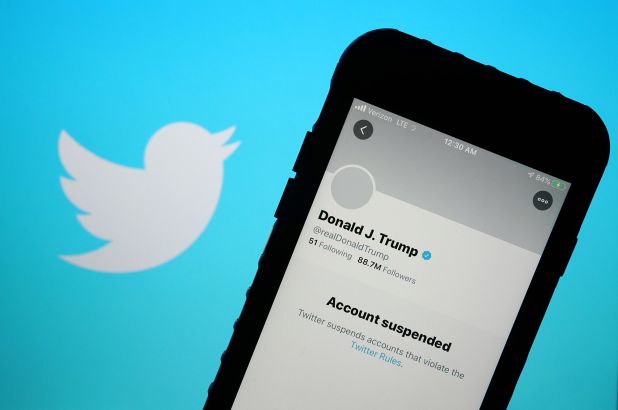
Trump’s Twitter ban sparks competition in Big Tech
By Damilare Tella
The capitol siege will remain one of the most, if not the most embarrassing incidents of America’s democracy in modern times. It has caused a stir in the global sphere, ranging from questioning of the authenticity of America’s democracy, to calls for impeachment of the man at the centre of it all and to brands taking actions, mostly to sever ties with some powerful personages.
While JPMorgan Chase, Coca-Cola, Amazon, AT&T, others indicated their aim to pause political financial contribution, Twitter in less than 72 hours after the incident, suspended the president’s account citing a possibility of a future occurrence.
“After close review of recent Tweets from the@realDonaldTrump account and the context around them we have permanently suspended the account due to the risk of further incitement of violence,” Twitter declared.
Through his Facebook page, Mark Zuckerberg, the CEO of Facebook, announced that the president has been suspended until the completion of the transition.
“We believe the risks of allowing the President to continue to use our service during this period are simply too great. Therefore, we are extending the block we have placed on his Facebook and Instagram accounts indefinitely and for at least the next two weeks until the peaceful transition of power is complete.”
But the question on the lips of many is: Has the democratic crisis handed to these brands the responsibility to determine what is and what is not within the social institutions? Acknowledging that these platforms are theirs, are they theirs to manage or to rule?
The fact remains that owners of big tech are a part of the larger society, which explains the ongoing brand equity erosion and rising competition by new rivals.
Citing the non-interference policy of Twitter over the years in a series of tweets, Alexey Navalny, Russian opposition leader stated: “Don’t tell me he was banned for violating Twitter rules. I get death threats here every day for many years, and Twitter doesn’t ban anyone (not that I ask for it).
“Those who denied COVID-19 exist freely and communicate on Twitter. Their words have cost thousands of lives. And yet, it was Trump who got banned publicly and ostentatiously. Such selectivity indicates that this was an act of censorship.”
Angela Markel, through Steffen Seibert, head of the German Federal Government’s Press and information office, unequivocally posited that such responsibility is strictly reserved for machineries of the state not helmsman of social media platforms. In his words: “This fundamental right can be intervened in, but according to the law and within the framework defined by legislators — not according to a decision by the management of social media platforms.”
The capitol incident was deemed unacceptable by millions around the world, as there have been universal pre-agreed standards. However, on what pre-agreed standard would Facebook, Twitter and Instagram justify their actions on their platform?
On his part, Andres Manuel Lopez Obrador, President of Mexico, asked: “Where is the law, where is the regulation, what are the norms? This is an issue of government; this is not an issue for private companies.”
Making his own case, Thierry Breton, European commissioner for the internal market and former professor of Leadership and corporate accountability at Harvard University in an article titled “Capitol Hill — the 9/11 moment of social media”, stated: “The fact that a CEO can pull the plug on POTUS’s loudspeaker without any checks and balances is perplexing. It is not only confirmation of the power of these platforms, but it also displays deep weaknesses in the way our society is organised in the digital space.”
He continued: “Our European laws and courts will continue to define what is illegal, both offline and online – from child pornography to terrorist content, from hate speech to counterfeiting, from incitement to violence to defamation — through democratic processes and with appropriate checks and balances. But currently, online platforms lack legal clarity about how they should treat illegal content on their networks. This leaves our societies with too many questions about when content should or shouldn’t be blocked.”
With the president having over 80 million followers on Twitter, the move has since backfired on the brand as reported in Reuters: “Twitter Inc’s stock tumbled over 6% on Monday after its move to permanently suspend U.S. President Donald Trump’s widely-followed account spurred a mass exit of his superfans.”
According to another report by Business Insider, Twitter’s stock price tumbled as much as 12% on Monday, erasing $5 billion from its market capitalisation.
Twitter stock likely fell because investors are worried the Trump ban will erode interest in the platform and lead to boycotts among those who see the decision as politically motivated and a way to silence a major conservative voice.
While it’s unclear exactly how many Twitter users are logging off and moving elsewhere, there has been an exodus for alternative platforms since Trump was banned.
Gab, another free speech alternative to Twitter, said they were hauling in 10,000 new users every hour on Saturday.
Moments after Trump was dumped, Parler crashed, likely because the crush of new users overwhelmed their servers. The outage lasted less than an hour. Even before recent tumult, Parler had become a popular spot for conservatives, with more than 2 million daily active users in October 2020, according to CNN.




Comment
No comments found.